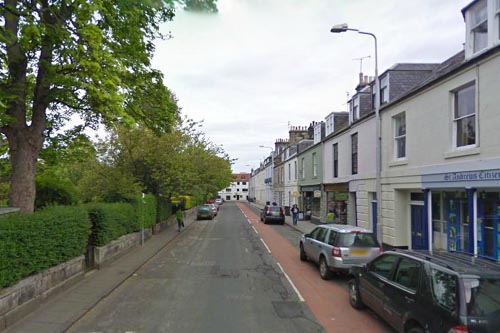ROADWORKS in a Scots town have been suspended after workers found skeletons believed to be those of 15th Century monks.
Archaeologists were called in after workers uncovered the bones while digging up a street in St Andrews, Fife.
Initial examination by experts suggests they are the remains of Franciscan monks who once lived in the area.
Work has now been stopped at the Greyfriar’s Gardens site to allow the area to be excavated and the bodies preserved.
The bones were discovered during work in Greyfriar’s Gardens, St Andrews
Fife council archaeologist Douglas Spiers, who has been trying to locate the monk’s burial ground for some time, has been excited by the find.
He said: “St Andrews is a town of considerable antiquity so we always held the possibility of archaeological remains coming to light in that area as part of these works.
“However, we thought that because they were only reducing the surface by a small margin it wouldn’t be deep enough to disturb anything.
“Clearly we were wrong.”
He said that because the bones were closer to the surface than expected, it was “abundantly obvious” the ground level had reduced over the last two centuries.
He said: “We’ve just uncovered them now and we’ve stopped work in that area.
“These are human remains in consecrated ground so they must be treated with proper dignity.
“We’ve covered everything over and we’re trying to draw as little attention to the site as possible.”
He said the find was most likely part of a cemetery that belonged to a Franciscan order.
“A Franciscan friary is known to have existed somewhere near the vicinity and because of their order they weren’t buried in the local cemetery but had their own little one,” he said.
“The exact footprint of the friary is not known and previous archaeological works in the area have failed to locate it.
“However there can be little doubt that today’s discovery represents part of the cemetery of the friary of Observant Franciscans established in the town with the encouragement of Bishop Kennedy in 1458.
“The human remains exposed have now been recorded and excavated although development works on this part of the site has been stopped to allow for further investigations and recording works to be undertaken by Fife Council’s archaeological unit.”
Analysis of the skeletons will now take place to try and find out more about the people who were buried in the cemetery.
Mr Spiers said tests would confirm whether or not the skeletons are monks.
He added: “I strongly suspect that radiocarbon dates will fall into the period 1458 to 1559 as we know from historical documentation that the friary was founded in 1458, completed in 1478 under Archbishop Graham and that it was an early casualty of the Reformation, being ransacked in 1559.”
The discovery is the latest of a number of historical finds in the town.
Last summer work in the town’s South Street uncovered some of the earliest remains of a medieval town house in Scotland, as well as a hoard of medieval pottery.


